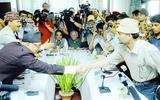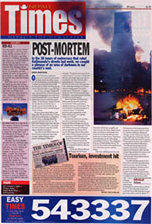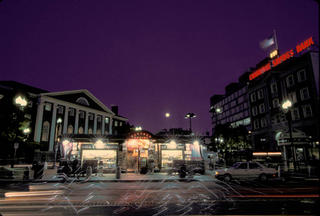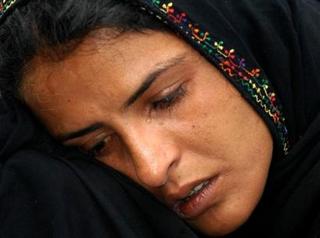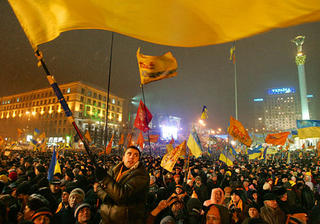
(I am posting again this article that I wrote when Dinesh Prasain, my high school roommate for three years, got beat up by the Royal Nepali Army early last year.)
Thursday, March 18, 2004
Prime Minister-Elect Dinesh Prasain: "You Have The Power!"The Kathmandu Post
November 4, 2010
By A Post Reporter
Speaking from his homevillage of Mugitar (pronounced Mujitar), Prime Minister-elect Dinesh Prasain has said that he is but a vehicle for the people to express their legitimate wishes, concerns and aspirations, and he will do the best he can to fulfill the promises he made on the campaign trail. He reportedly returned immediately to his symblic roots after winning the necessary votes in the Pratinidhi Sabha.
"Satta tapain haroo to haat maa chha, mero haina!" he said in Nepali, which is a loose paraphrase of the most famous line of the US presidential candidate Howard Dean who fizzled out in 2004 and again in 2008.
Some foreign correpondents were quick to point out that Prasain is the youngest Prime Minister in the history of the world, having beat Benazir Bhutto's record of 35. But Prasain's Defense Minister designate Kiran Sitoula informed the press in a conference call from Washington DC where he has been working as USA Today's bureau chief for the Chesapeake Bay region that such claims might not be warranted.
"Please don't go by Dinesh' official birthdate. It might be misleading. As is mine and those of a host of others who graduated high school together," Sitoula reportedly said.
He attributed it to cultural differences not immediately comprehended by the western eyes. "We celebrate festivals not birthdays where we come from," he added.
Some in Nepal wondered if Sitoula were referring to Prasain's eyes, but Sitoula made it clear that was not so. Sitoula acted utterly surprised such conclusions could have been drawn from his words.
Dilip Parajuli, Nuru Lama, and Swarnim Wagle are some of the other names floated for several top jobs in the government. Diwaskar Adhikari has said he will be an informal advisor to the Premier like he has always been, and that he will continue to stay abroad. He was last thought to be in Brazil.
CNN, Fox, and Drudge Report television cameras have supposedly descended on Pawan Adhikari's apartment in Manhattan and media helicopters are in the air.
"This is OJ-style fame for being Kiran Sitoula's roommate at high," Adhikari said.
It was later found out Adhikari never was Sitoula's roommate but they were in the same hostel twice.
The national media is abuzz with stories about the rapid rise of the Janata Dal. Dinesh Prasain rode a wave of support for him from his COCAP days as a skilled human rights activist after he got beat up by some members of the Royal Nepal Army early in 2004. The incident brought home an international and, followingly, a national outcry. The first result was that it became hard for anyone in Kathmandu to cast an evil eye on Prasain again. The second outcome was that COCAP saw a record number of volunteers to its causes nationwide. But the most dramatic and unexpected impact was on national politics.
The right wing got exposed to the point international pressure made King Gyanendra declare a referendum, conducted by an all party government headed by Madhav Nepal, to bring the civil war to an end. And the people voted to keep a multi-party democracy, but chose to discard the monarchy, and instead have a republic, which the Maoists accepted, as they had vowed to accept the outcome of the referendum, and had laid down their arms before it could take place.
King Gyanendra has gone back to the world of business and is expected to continue producing cigarettes for the domestic and the international markets.
Prasain reportedly held talks a few days back with Paramendra Bhagat in Hawaii offering him the presidency, since his party has the necessary number of votes, but Bhagat declined saying it might be too sexist for two men to hold the two top jobs in the country. And so Prasain has declared he will throw his support behind Renuka Devi Yadav from Birgunj, his colleague from his days in human rights activism. Bhagat also said he needed to stay on with his rapidly expanding global online marketing business that looks like will take over Walmart as the largest company in the world.
"I hope I can help Nepal on the global stage, especially on trade issues," Bhagat said, hoping to offer his vast global contacts, including those in India, his motherland, since his mother is Indian.
Bhagat also suggested he will instead focus on getting the United Nations reorganized, for which Prasain's role in the Global South would be indispensable.
It is well documented that Prasain could not resist pressures to enter politics after the civil war came to an end. And when he did, he came forth with a progressive agenda that the party of his choice, the Nepali Congress, could not stomach. He was assured a ticket but nothing much else. To that he and his supporters responded by floating a new political party, the Janata Dal. The Dal grew fast enough that it was able to field a candidate in every constituency in the country. They surprisingly emerged the largest party in the country, but did not have the majority. The Nepali Congress, the UML, the RPP, the Sadbhavana, the NMKP, and the Maoist Party forged a coalition government that lasted three years, after which the Maoists split away from the coalition. And elections had to be held, to which the Janata Dal came up with a majority of seats in the Pratinidhi Sabha that many describe as Blairite: Janata Dal 130, Nepali Congress 40, UML 30, and the RPP 5. The other parties have lost their national status.
The average age of a Janata Dal MP is 32. When brought to attention Prasain responded, "That befits a country where more than 40% of the population is less than 14 years old."
Prasain has a Masters in Sociology from Tribhuvan University, and has taken several elective courses on Methodology, Economics, Environmental Science, Global Economics, Mass Psychology, French, and Bengali from the University Of Phoenix Online. He says he hopes to complete a few courses in Sanskrit while in office to "keep my mental muscles in shape, besides, we are in the computer age."
Although his political career got launched on the anti-corruption platform, aka V.P. Singh style, Prasain says the national economy is his number one priority. Second, the Dal will repeal every sexist law in the country. Third, the country will have the most progressive anti-corruption laws and law enforcement anywhere in the world, the Dal manifesto says. Fourth, three years into the term, the Dal will organize a nationwide referendum to see if the people want a federal form of government or not. The Dal reportedly got a huge boost from the Madhesi and the Janajati communities and has been seen as a major voice for social justice, both in the country and on the sub-continent.
"In India they elected Indira Gandhi Prime Minister several times. But they never really tackled legal and social sexism," Prasain opines. "We will be different."
"We are a strong voice for social justice. But let there be no misunderstanding, my first priority will be rapid economic growth. There is no reason whey a country like Nepal can not achieve the ecomic status of a Singapore within two decades of hard work," Prasain said in an interview to Time magazine. "China and India are about to surpass the U.S. in terms of size of GDP. Guess where that puts the center of gravity for the world economy!"
Major high tech multi-national companies have already offered to lay down a national fiber optic grid, "the very best in the world," on BOOT basis, Build-Own-Operate-Transfer. The executives seem to have the opinion it is easier to lay down such a grid in a country like Nepal where all work will have to be from scratch. "There is less confusion. You don't have technology from three different decades sharing the same space, on the ground and, worse, in people's minds. You are looking at literally everyone in the country having broadband internet access. If you can have Harvard and MIT lectures delivered right here, why would you want to fly over to Harvard? It gets cold there in Boston in winter. Geography truly is irrelevant."
"We will make massive investments in human capital, and we will open up to the global economy which will take care of the rest."
The Univesity of Phoenix Online has decided to move over to Kathmandu to honor its most famous student.
"Who's next!" Prasain asked with a sly smile. The Premier's aide Jagadish Bhattarai failed to elaborate on the smile. And the Labor Minister designate Krishnanath Shah - not to be confused with the now gone royal clan - also refused.
The Dal General Secretary G.P. Singh is said to not go into the government so as to keep working full time to keep the party agile "because every major agenda on our platform will ask for a national campaign."
Laloo Yadav of Bihar is said to have said of Prasain, "Wo babhan hai, lekin honhaar ladka hai. Laloo ka aadmi nahin hai to kya hua!"
**********
AdvocacyNet
News Bulletin - Number 13, January 21, 2004
**********
NEWS FROM THE ADVOCACY PROJECT
NEPALESE HUMAN RIGHTS LEADER AND AP PARTNER BEATEN BY SECURITY FORCES
Washington, D.C., January 21, 2004: A leading Nepalese human rights activist and Advocacy Project partner has been severely beaten at his home in Kathmandu by a group of armed men from the Nepalese security forces, in an apparent attempt to intimidate Nepal's vocal human rights community at a time of growing insecurity in the country.
Dinesh Raj Prasain, coordinator of the Collective Campaign for Peace (COCAP), was attacked at his home on January 13, and the event has triggered a major outcry among civil society in Nepal. In a press release issued January 15, twenty-seven prominent human rights activists appealed for international solidarity, and demanded a full and public investigation by the Royal Nepal Army and the National Human Rights Commission.
'(This attack) has exposed the insensitivity of the government towards the safety and protection of citizens,' states the release. 'It is a naked attack on all of us human rights activists who are always committed to advocate human rights of the people.'
COCAP is a community-based network of some 40 community-based groups working to rebuild Nepali society in the face of a bitter conflict between the central government and Maoist insurgents. The Advocacy Project arranged for Kate Kuo, a Georgetown student, to work with COCAP during the summer of 2003.
The attack on Mr. Prasain was clearly vicious and premeditated. According to Mr. Prasain's own account, about six men knocked on his door just after midnight on January 13, refused to provide identification, and then proceeded to break into his residence.
'One of the men pulled out a revolver and said he would shoot me if I did not open the door. I felt very fearful, and closed the door and latched it from inside. They started pulling and kicking the door. I did not know what to do, and in the frenzy, I ran towards the kitchen, planning to jump off the veranda. But within seconds, they broke the door, caught me and started beating me severely. They beat me up on my face, head, stomach, back and thighs with fists and kicks. I guess at least four of the six persons beat me. They beat me continuously, pulling me kitchen to corridor, corridor to kitchen.
'They asked why I tried to escape, if I had not some thing to hide. I told them that I was fearful that they were professional criminals, and kept on insisting that they show me their ID cards. One of them showed his ID but blocked his name.'
Mr. Prasain's 72-year-old father and nephew, who witnessed the search and assault, stated that one member of the group carried a 'long gun.'
Following the attack, COCAP commissioned a fact-finding team from seven COCAP member organizations. The team, which included the Vice President of the Nepal Bar Association, concluded that the assailants were from the security forces because according to eyewitnesses, they were led by an unidentified 'major.' Given that no other houses were searched in the area, the sole objective was clearly to assault Mr. Prasain.
Thousands of Nepalis have died since the Maoist insurgency erupted in Nepal in 1996. A brief ceasefire collapsed last August, leading to renewed violence and abuse. On 12 November 2003 the UN issued a press release in which three UN human rights monitors expressed 'profound concern over reports that dozens of individuals are being detained secretly in Nepal and are therefore at risk of suffering torture and other forms of ill-treatment.' Amnesty International has documented the disappearance of 250 persons by the security forces during the fighting. The Maoist rebels have also been blamed for disappearances and abuses.
While the recent attack on Mr. Prasain would seem to be a blatant attempt to intimidate one of the country's leading peace activists, it may also be linked to Mr. Prasain's own forthright stand against NGO corruption. Several local NGO leaders objected strongly to a December 2003 article in which Mr. Prasain criticized Nepalese NGOs.
After the article was published, Mr. Prasain received threats on his life. He feels it is possible that the security forces were falsely told that he was harboring Maoists, and were even bribed to attack him.
In the view of COCAP members, such a possibility only increases the need for a full and public investigation.
* For more information contact Laura Stein at info@advocacynet.org
* For a report of the COCAP fact-finding mission into Dinesh Prasain's beating, visit: http://www.advocacynet.org/resource_view/link_389.html
* For Dinesh Prasain's account of his beating, visit: http://www.advocacynet.org/resource_view/link_390.html
* Email or contact the Nepalese government, calling for an inquiry. For a complete list of embassies and consulates, with contact details, visit: http://www.immi.gov.np/location.php
* For a report of Kate Kuo's internship with COCAP, including her blogs, visit: http://www.advocacynet.org/cpage_view/interns03_COCAP_22_48.html
*
The Advocacy Project is based in Washington D.C. Phone: +1 202 332 3900;
fax: +1 202 332 4600. Visit the AP web site for information about current projects: www.advocacynet.org. For more information please e-mail info@advocacynet.org

